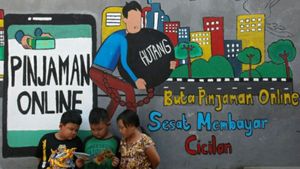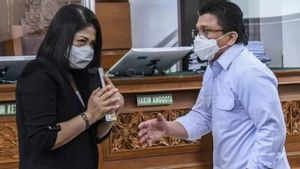Air quality in DKI Jakarta and its surroundings has been in poor status in recent months. Not only Jabodetabek, almost all cities in Indonesia have unhealthy air quality. According to data on the IQAir website on Friday (18/8/2023), Jakarta ranks fourth in Indonesia with the worst air quality. Jakarta is below South Tangerang, Tangerang City, and Terang, West Kalimantan.
Air quality in the capital city reaches 140 AQI (Air Quality Index) which means that air quality in Jakarta is categorized as unhealthy. For information, air quality is categorized as good and does not pose a risk to health at AQI 0 to AQI 50.
Air pollution in Jabodetabek certainly does not escape the attention of parents. Many parents complain that their baby has a cold cough and mention pollution as the cause.
This is also experienced by artist Dewi Sandra who also complains about air pollution in Jakarta and its surroundings. According to the 40-year-old artist, the worsening pollution greatly has an impact on the health condition of her children who are vulnerable to illness.
"Oh, yes, the pollution is severe. With (air) pollution like this, they are lazy, struggling, even though they don't do anything about it," he explained.
Air pollution is an invisible threat to children's health. World Health Organization (WHO) data shows that air pollution kills 570 thousand children under the age of five every year. Children who are exposed to pollution can trigger various problems such as reducing lung function and triggering asthma, thereby inhibiting brain development.
Worldwide pollution has a negative impact, especially on children. Children who are often exposed to pollution will be easily sick, experience learning disorders, to stunting. This is because children are more vulnerable than adults. In the long term, children who are accustomed to pollution will experience impaired physical abilities and intelligence.
But actually air pollution is not the cause of Acute Respiratory Channel Infection (ARI) as parents complain. Doctor Darmawan Budi Setyanto, SpA(K) as a member of the IDAI Respiratory Coordination Work Unit (UKK) said, straightening this out. According to him, pollution does not necessarily cause a simultaneous or better known as a cold cough.
It should be understood that air pollution only increases the risk of ARI, not the cause. The cold cough that is often experienced is due to infection, which is caused by the entry of germs into the body. Pollution damages the respiratory tract defense mechanism, so germs that cause ARI are easy to enter and develop. The risk of pneumonia and asthma is also increasing. However, the cause of ARI is infection, not air pollution," said Darmawan in an online seminar entitled Air Pollution Impact on Children's Health on Friday, August 18.
The DKI Jakarta Health Office said that around 100 thousand residents in the capital city experience ISPA every month due to the weather shift. Quoted by Antara, there was an increase in cases from 99,130 in May 2023 to 102,475 cases in June.
Darmawan emphasized that the Indonesian Pediatrician Association (IDAI) has so far not conducted further research regarding the alleged increase in cases of ARI in children caused by air pollution.
"There is no data yet, IDAI will conduct a survey of IDAI members whether cases of cough and runny nose are increasing," added Dammawan.
Director General of Environmental Pollution and Damage Control (PPKL) Sigit Reliantoro detailed the sectors that contributed to pollution in Jakarta. According to a study conducted by his party, transportation contributed about 44 percent of emissions, 31 percent of industry, 10 percent of manufacturing energy industry, 14 percent housing and 1 percent of commercial.
Turning from conventional oil-fueled vehicles to electric vehicles is said to be essential for residents in Jakarta. The public is also expected to switch from private vehicles to public transportation.
Vehicle smoke is one of the biggest contributors to pollution. However, most people don't seem to realize that pollution can also come from environmental and household pollution.
The WHO says about 2.4 billion people worldwide or about a third of the global population, cooking using open flames or inefficient stoves fueled by kerosene, wood, animal droppings, crop and coal waste that produce harmful household air pollution.
Still from the same source, household air pollution is responsible for about 3.2 billion deaths per year in 2020, including more than 237 thousand children under the age of five. The combination of environmental pollution and household air pollution caused 6.7 million people to die early.
'Regarding pollution, whose job? Yes, our job is to start from households, clinics, governments, and the global community. In villages there are still many who use wood as fuel, even though it is dangerous," said Darmawan again.
Meanwhile, Head of the DKI Jakarta Health Office Ani Ruspitawati emphasized that her party continues to implement promotive preventive measures to control ARI disease. Ani explained that the Jakarta Health Office will continue to educate the public about clean and healthy living behavior. Both in schools, neighborhoods, and workplaces.
The PHBS' in question is like not smoking, doing physical activities, eating healthy and nutritious foods to increase immunity so that it doesn't get sick easily,' Ani explained.
Since the issue of air pollution has been widely discussed, the discourse of Working From Home (WFH) has resurfaced. WFH is believed to help reduce air pollution in Jakarta because the smoke produced from the vehicle is automatically reduced. The WFH discourse of course coincides with the call for Distance Learning (PJJ) for school children.
Both methods have been carried out by Indonesia and other countries in the world when the COVID-19 pandemic hit. Darmawan said that for now IDAI is still reviewing the possibility of implementing PJJ.
Pollution is actually not a new problem and it is not yet known whether pollution is the main cause of the increase in ARI cases in children. We must not rush to conclude, we need a more in-depth study, a more mature assessment," Darmawan explained.
SEE ALSO:
"What happens when you stay in school and the children stay in school, it will infect their friends because the virus spreads quickly. It is too early to conclude that the cough has a cold just because of pollution, it still needs further study," he said.
Dr. Darmawan Budi Setyanto then encouraged all parties to be involved in tackling pollution in Indonesia. He hopes to provide proper public transportation so that people feel comfortable using it.
"We hope that the authorities provide good facilities for children, then provide education to the public about healthy lifestyles including not smoking, and most importantly integrated and comfortable public transportation," he concluded.
The English, Chinese, Japanese, Arabic, and French versions are automatically generated by the AI. So there may still be inaccuracies in translating, please always see Indonesian as our main language. (system supported by DigitalSiber.id)

















